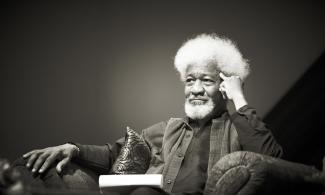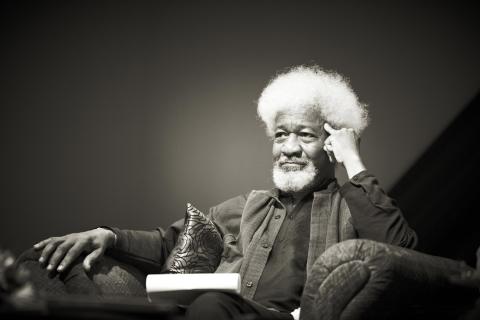
Should Soyinka depart today, it would appear as if the majestic authority of literature is dead. It would almost mean the end of the indestructibility of the pen, the death of reasoning and original thinking.
Wole Soyinka was 26 years old in 1960 when Federal Government commissioned him to produce a play for our independence Celebration. His play: “A dance of the forests” was rejected because the “play was unfit for celebration”. Had Nigeria accepted the play and its message, Nigeria would certainly have been a better nation today.
In assessing the literary impact of Soyinka, it should be noted that He’s (about) the only African writer with prodigious productivity in all genres of literature (Prose, Poetry and Play) and yet more (music and cinema). Let’s start with Drama. He formed his drama troupe (1960 masks in 1960); this became Orisun theatre in 1963. This troupe who collaborated with Hubert Ogunde, Duro Ladipo, Kola Ogunmola and produced theatre greats like: Jimmy Solanke, Tunji Oyelana, Taiwo Ajai lycett, Olu and Joke Jacobs and Sam loco could be said to be the origin, the bed rock of today’s Nollywood. Many practitioners of theatre today, many scholars and writers of drama are his boys!

He wrote A Dance of the Forest (1960). Kogi’s Harvest (1965). Death and the King’s Horseman (1975). A Play of Giants (1984). From Zia with Love (1992). Beautification of Area Boy (1995). King Baabu (2001) etc. It is to be mentioned that his drama works cover almost all aspects of Human existence. “Death and the King Horseman” staged on the Broadway (1987) to world acclaim remains one of the world’s best.
His poetry collections include: Idanre (1967). Poems from Prison (1969) Mandela’s Earth (1988). A shuttle in the crypt (1972). Samark land and other markets…(2002) etc. It would have been outrageous if he had been denied the Nobel with this unusual productivity. In any case let’s consider the official statement from Stockholm on the award: “in a wide cultural perspective, and using strong poetic undertones, Soyinka fashions out the drama of existence” in other words, he was given the Nobel because: (1) of his strong poems, (2) he operates from a wide world view, (3) his plays address the entire human existence!
His Novels include the Interpreters (1965). Season of Anomy (1973), Collection of Essays; the credo of being and nothingness (1991). Open Sore of a Continent (1996) – where he recounts Nigerian history (1960 – Abacha years). His major critical work: “Myth, Literature and the African World” (1976). In 1999 he wrote: “The Burden of Memory and the Muse of Forgiveness” (which deals with crimes against humanity and the difficult issue of reconciliation. Added to these are his collections of lectures: Climate of fear; the quest for dignity in a dehumanized World (2005).
Three autobiographical works: Ake (1981). Isara (1989). You must set forth at dawn (2006). He produced a popular long playing music album (1983). He has produced an equally popular film on celluloid (1984) all to attack the inept civilian regime of Shagari.
His works are far more than this, but this summary will do. As a result of this unusual prodigious volume of work, he has become a father figure in our literary world. When he has not spoken on an issue, it is as if the ultimate authority has not talked. The authority that his name carries is awesome. In him, the relationship between literature and society, between ideas and man, between the word and the world become so evident. No other African writer has been able to bring to bear on man and society, the power and influence of literature.
In his writings, in single sentence a story is told, a page is often compressed into a single sentence (which is why we crucify him for being “obscure” and “unreadable”). He has written on almost all aspects of human social and emotional life. Though his style and language could sometimes be hard, but is there any secondary school student in those days that did not understand the “Lion and the Jewel” or the “Jero plays”? How difficult is “Ake”? Who will not marvel at his “Death and the Kings Horseman”?
His poetry is something else; in a single poem five others can be distilled with different topics, which is why the comparison between him and Achebe is trite and unnecessary. Achebe is a great story teller, with clear simple prose: he has addressed some of our human conditions, but how many books did he write? Which of our moral, fundamental issues did he deal with? What were his moral and human battles and victories? What are his legacies? What did he leave us with? What will future generation thank him for? beyond his simple readable prose? It is definitely not true that “Achebe pioneered and popularized modern African English literature”. This was done by Amos Tutuola through Palm wine drunkard (1952).
Should Soyinka depart today, it would appear as if the majestic authority of literature is dead. It would almost mean the end of the indestructibility of the pen, the death of reasoning and original thinking. Should he depart today, who will fight for us? Who will bring faculty to bear on our national life? Who will challenge us mentally and task us cerebrally?
His belief and optimism in Nigeria is unshakeable. His confrontation with all forms of abuse of power is legendary. His advocacy of the intellectual culture and his campaign for a life of reasoning stand him out. He believes so much in the power of ideas and the majestic influency of lite.
His essay “When a Nation” remains one of the greatest political document for Nigeria. He argued in that paper that a Nation is not a fixation, not a sovereignty that can’t be negotiated, not a constant. He says Nations go through redesign, restructure until the people finally agree on the concept; but he prefers Nigeria to still be one, even though we need to dialogue the mode of staying together, he argued also that what we need is healing, not reconciliation. I recommend the poem he wrote for Achebe’s 70th birthday, reproduced for his funeral to all Nigerians, to show case the genius of the man.
Africa’s most persecuted writer (jailed for 3 years, exiled twice, wrongly charged with treason, his house burgled and destroyed), yet unlike Achebe, there is no bitterness in him (anger sometimes, yes!). Neither does he exhibit any persecution complex; he is far too elevated for that. Instead he remains one of the world’s most debonair, most traveled and urbane writer with great exotic taste.
Whenever the nation is facing a challenge, should we look hard, behind the challenge you will see a grey haired, grey bearded man, smiling at you, saying “I have analyzed this challenge before, I have solved the problem, just go through my books” No more will anybody in this land ask the question “ what’s literature got to do with it”!
By: Olusanya Aribatise
O. O. Aribatise is a Federal bureaucrat and technocrat. Contact him at [email protected] or 08033763903.